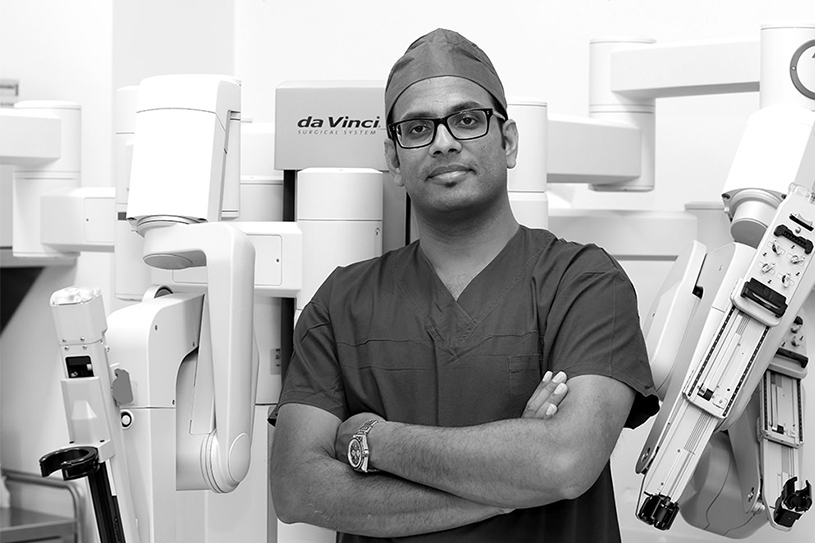Minimally Invasive, Maximally Effective: Robotic Surgery for Urological Conditions
Minimally Invasive, Maximally Effective: Robotic Surgery for Urological Conditions

Robotic Surgery for Urological Conditions: Precision, Recovery, and Results
Robotic surgery is transforming the way urological conditions are treated, offering patients a minimally invasive approach with enhanced precision and faster recovery times. With the expertise of highly trained specialists like Dr Mohan Arianayagam, robotic surgery is now a leading option for treating a range of complex urological issues.
What Is Robotic Surgery?
Robotic surgery involves the use of specialised instruments attached to robotic arms, which are controlled by a surgeon via a computer console. Rather than performing procedures with their hands, the surgeon uses this system to direct the robotic instruments with exceptional accuracy.
The system includes a camera arm with a high-definition 3D endoscope that provides magnified views of the surgical area. The surgeon’s hand movements are translated into real-time, precise movements of the robotic arms—allowing for complex procedures to be carried out with minimal disruption to surrounding tissues.
Urological Conditions Treated with Robotic Surgery
Dr Arianayagam is a leading urologist with extensive experience in robotic surgery. The technique is widely used to treat numerous urological conditions, including:
-
Robotic radical prostatectomy – removal of the prostate gland due to cancer
-
Robotic nephrectomy – complete removal of the kidney
-
Robotic partial nephrectomy – removal of part of the kidney affected by cancer
-
Robotic cystectomy – removal of the bladder due to cancer
Other surgical procedures that may be performed robotically include:
-
Coronary artery bypass
-
Gallbladder removal
-
Hip replacement
-
Hysterectomy
-
Pyeloplasty (surgical reconstruction of part of the kidney)
Benefits of Robotic Surgery
Robotic surgery offers several advantages over traditional open or laparoscopic procedures:
-
Greater precision and control
-
Ability to perform complex and delicate surgeries
-
Reduced pain and blood loss
-
Lower risk of complications and infection
-
Shorter hospital stays and faster recovery
-
Smaller incisions and less visible scarring
-
Preservation of function – for example, a lower risk of erectile dysfunction following bladder or prostate surgery
Understanding the Risks
While robotic surgery is considered safe and effective, all surgical procedures carry some level of risk. Possible complications include bleeding, infection, and blood clots. However, robotic-assisted techniques generally reduce the likelihood of these issues when compared to traditional surgery.

Dr Mohan Arianayagam: A Leader in Robotic Urology
Dr Mohan Arianayagam completed advanced fellowship training in robotic surgery under the guidance of Professor Dr Murugesan Manoharan at the University of Miami Miller School of Medicine. During this time, he gained deep expertise in robotic radical prostatectomy, which has since become his preferred method for treating prostate cancer.
Dr Arianayagam performs robotic surgery at Macquarie University Hospital and Nepean Public Hospital. Notably, Nepean Hospital operates NSW’s only public robotic surgery program, making this advanced care available to public patients from across the state.
Since returning to Australia, Dr Arianayagam has successfully completed over 250 robotic surgical procedures, and is also certified to train other surgeons in this technique.
In addition to prostate surgery, Dr Arianayagam also performs:
-
Robotic radical and partial nephrectomy for kidney cancer
-
Robotic radical cystectomy for bladder cancer, with potential preservation of erectile function in selected patients
Considering Robotic Surgery?
If you’re facing a urological condition and exploring treatment options, robotic surgery may offer a less invasive, highly effective solution. It’s important to speak with a trusted urologist to determine whether it’s the right option for your condition.
For more information or to book an appointment, contact Dr Arianayagam’s office at 1300 307 990. His team is available to assist with both public and private referrals.

The Benefits of Drinking Water for Urological Health: Do You Really Need 8 Glasses a Day?
We’ve all heard the advice: “Drink eight glasses of water a day” But is this rule as important as it…

Protect Your Kidneys: Simple Habits for Better Health
Keeping your kidneys in shape is vital for reducing the risk of chronic disease. Check out some of our top…






